President John Dramani Mahama's engagement with Alex Soros, an American billionaire and philantropist
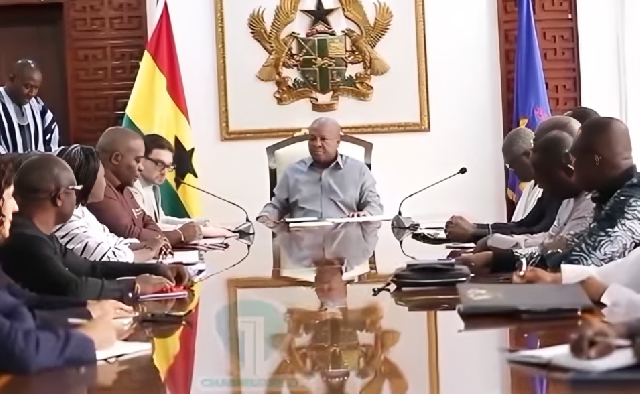 Channel One (Pic): President Mahama welcomes Alex Soros to the Jubilee House
Channel One (Pic): President Mahama welcomes Alex Soros to the Jubilee House
We're happy to have Soros, because there's always a pleasant thing when you meet together and have shared values.
And I think our values of democracy, respect for human rights, freedoms of our people are the same. And so it makes it easy for us to work together.
Ghana as a pioneer in Africa's Liberation struggle
Ghana, as a country, has been a pioneer in several things.
In the independent struggle, we were the first to liberate ourselves from colonialism south of the Sahara.
And Ghana became the headquarters for the anti-colonial struggle.
And so all the liberation fighters from all countries, from Zambia, South Africa, at the time, lived in Ghana and held Ghanaian passports to allow them to be able to travel freely. And so Ghana has played that role.
Ghana's 1992 Constitution
In recent times, after Nkrumah's Government was overthrown, we had a revolving door of military governments. And I mean, the country was still trying to find its real purpose in the scheme of things. And eventually, in 1992, we adopted a new constitution.
And it's been 33 years now that Ghana has had a stable democracy.
We've had nine elections, all have gone successfully. And we've had several changes of government from one party to another.
And these have all been successful. So currently, Ghana stands as a beacon of peace and democracy, not only in West Africa, but in the whole of Africa.
And Ghana is a respected voice when it comes to democracy and good governance.
ECOWAS
And so as a part of ECOWAS, we're concerned with sub-regional geopolitical issues.
We have protocols that deal with unconstitutional changes of government. And in my previous incarnation as president, I was chair of ECOWAS.
And we had similar situations where changes of government happened. And these protocols existed. It involved placing sanctions on the country and so many other things.
But I've always said that those things are a last resort. You use diplomacy first. And if it doesn't work, then you look at sanctions.
Unfortunately, when the last spate of coup d'etats happened in Mali, Burkina Faso, and Niger, the first instrument that the leaders resorted to was, one, the threat of an invasion into Niger. And secondly, they began to apply sanctions. They stopped the transit trade, they cut off power supply to the other countries.
And so it created a situation where there was a breakdown of trust between the leadership of those countries and the Sahelian authorities.
And so they decided that they were going to form a confederation of their own and break away from ECOWAS, which is a sad thing because ECOWAS has had a positive effect on the sub-region in terms of free movement of people.
ECOWAS was one of the first to introduce free movement of people across our borders.
And we also introduced the ECOWAS Trade Liberalization Scheme (ETLS), that allowed us to trade goods between each other tariff-free. And so this development was quite a sad one.
I came into office in January, one of the first things I did was to invite the leaders (of the Alliance of Sahel States) to my inauguration as President.
And after that, I visited all three countries and tried to establish a channel of communication and continuous dialogue with them.
We held an ECOWAS meeting barely three weeks ago. And happily, the whole mood has changed.
And there is now an appetite for rapprochement between ECOWAS and the three countries.
And so there's some discussion going on between the ECOWAS secretariat and the three Sahelian countries. But in the meantime, we all agreed that, look, let's leave the protocols. Let our people be able to move freely.
Let goods be able to move freely across our borders. Let's encourage the transit trade. And most of the countries that impose sanctions have actually raised all the sanctions.
And so I think that we have created a platform where some more discussion can go on.
Ghana's economy
With regards to Ghana, we won the election in December and came into office in January. And we met a quite difficult situation.
We had had a situation where, at a point in time, the economic managers had gone on a borrowing spree and borrowed on the Eurobank market almost $13 billion in a period of about three to four years.
And so it affected our debts to GDP, and our debt became unsustainable. Aside from that, I mean, all the microeconomic indicators went out of gear.
You know, inflation went as high as 54%. And the primary balance went out of kilter, negative. You know, the currency depreciated, you know, very drastically.
And so the country had to go into an IMF program, which it did. And we inherited that program called the Extended Credit Facility. It's a three-year programme.
And we inherited it in January. And so it runs its course in April next year. But what it means is that we have a program with the IMF.
We've signed on to some conditions and all that. And so far, we have tried to meet those conditions.
In the second half of the year, in the run-up to the election, well, one can understand the incumbent government was facing an election.
And so they had no appetite for imposing the conditions that they had agreed with the IMF. So when we came, all those targets had been missed.
Commending Dr Cassiel Ato Baah Forson, the Finance Minister for turning the economy around.
He said Dr Forson has been implementing a quite austere fiscal programme that introduces, strict discipline in the way we conduct our expenditure.
And then also putting in measures to raise revenue.
We've started feeling the effects of the more disciplined economic management because inflation is coming down rapidly.
And we expect that by the end of the year, we should hit single digits.
The local currency has appreciated in value 42% in six months. And also the debt to GDP has declined sharply.
Reset Agenda
We're implementing what we call a reset agenda. And the reset agenda covers not only issues to do with the economy, but also with governance.
A lot of things had gone out of kilter with our governance. Our institutions had been weakened. Democratic institutions were weakened.
Fight Corruption
And there's a lot of corruption, lack of accountability. And so we came with a program to strengthen the anti-corruption institutions. And we had a project called Operation Recover All the Loot.
It meant to recover all the loot that had been taken away from the Ghanaian people. And so you might hear of prosecutions and things of people who actually have mismanaged public resources. And we continue to pursue accountability.
Even with people who work in our government, we believe that accountability should not be post-regime accountability. It must be current. And so even as you're prosecuting people who did things in the past, you must have the courage to prosecute people if they do the same things in your administration.
And so we're giving the anti-corruption institutions a free hand to do their work. The Attorney General is the focal point. And we have three main anti-corruption institutions, with no form, the Commission on Human Rights and Administrative Justice, the Office of the Special Prosecutor, the Economic and Organized Crime Office, and the CID, Criminal Investigation Department of the Police Service.
And so all of them are investigating one thing or the other. And I have said clearly that I was not going to interfere in any investigations that they were undertaking. They do have some problems in terms of investigators and we need more training for staff of those offices so that they can do their work well.
We need assistance with organizations that are specialized in tracking stolen funds and being able to recover them. And so those are some of the issues that we have to deal with. On the governance front, we have been operating this constitution for 33 years.
National Constitutional Review Committee
And so the time has come to look at some aspects of the constitution and tightening it so that it becomes relevant to the current dispensation. So I set up a National Constitutional Review Committee, which will present its report in August. And when it does, we need to go through the process of validating and then beginning to implement the recommendations that they will make.
Our constitution has entrenched and unentrenched clauses. With unentrenched clauses, you just need parliamentary approval. Happily, we have a very overwhelming majority in parliament.
I reckon it's due to your mandate, sir. Yes, I noticed that. And so we just got one more constituency.
And so it takes us to 184, which is exactly two-thirds of parliament. And there are three independent candidates who have opted to work with us. And so we have a good majority to be able to move things.
But I've said that we're not going to misuse our majority. We're going to try and reach consensus with everybody so that everybody moves forward with us. And so that's where we are at.
But there are other issues to do with getting the economy back on track, production. We have the Volta Lake Economic Corridor.
Green Energy Transition
We renamed the Ministry of Energy to the Ministry of Energy and Green Transition to put the emphasis on the green transition and having to put in more renewable energy instead of continuing to burn fossil fuels.
Ghana is one of the leading producers of oil and gas in West Africa. And we've recently made some more discoveries.
With the natural gas, our intention is to use all of it for power production.
And so we're feeding it to the thermal plant so that we reduce the amount of liquid fossil fuels that we're using.
And then we intend to put in more solar and wind energy.
The renewable energy mix, we should have 10% renewables as a percentage of our total power production.
If you add hydro and solar, I think we have achieved more than 10%. But we need to continue to add on.
Shahel Region
Sahel continues to be a danger for violent extremism. And it's just right on our northern border.
And so the Accra Initiative was established. But because of what happened between the ECOWAS and the Sahelian states, they have expressed disinterest in continuing in the Accra Initiative.
So what it means is we either reform the Accra Initiative or find a new platform on which we can cooperate with them in the fight against violent extremism.
Because clearly they can't fight it alone. And the extremists have made some significant gains in terms of territory they are holding in the various countries.
And it affects trans-ECOWAS trade because our drivers who drive international between Burkina Faso and Niger have been attacked and some have been killed.
You know, their vehicles burned by the extremists. And so it's a concern for all of us. And we just continue to keep talking to them to see how we can work together to assist them overcome this.
Natural Resources Management/Climate change
There's also the issue of natural resource governance in respect of illegal mining and forest degradation.
And so that's something. Then there's also the issue of climate change and adaptation. Our cocoa production has gone down because of the rainfall pattern.
It has changed. And cocoa is a tree that loves moisture. And so we're going to have to help the small-scale farmers with small irrigation schemes so that even when there's a gap in the rainfall, they're able to keep their farms irrigated.
AU Reparations
And we just came from the AU Summit in Malabo, Equatorial Guinea and they've extended it from a year of reparations to a decade of reparations.
So from 2026 to 2036, is going to be the decade of reparations.
Happily, we have the African Union (AU) and the Caribbean Community (CARICOM)
meeting coming up soon and that is going to be one of the platforms of where we continue the advocacy on reparations and restitution.
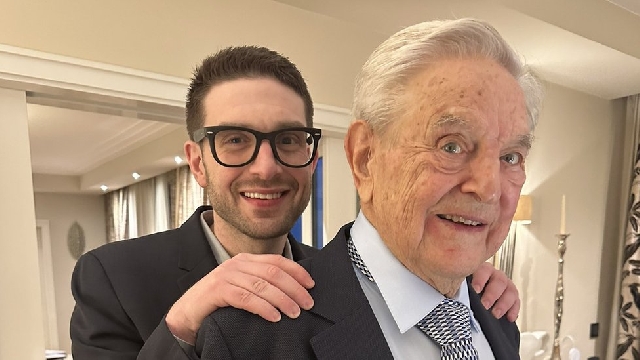 | Alex Soros with his father George Soros
| Alex Soros with his father George Soros
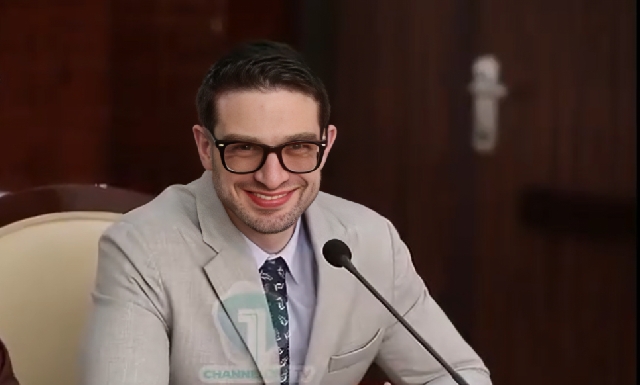 | Channel One (Pic): Alex Soros in Ghana's Jubilee House
| Channel One (Pic): Alex Soros in Ghana's Jubilee House
Source: classfmonline.com
Trending Features
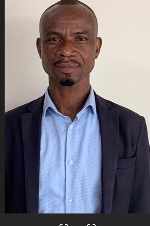
Stop letting Maths and Science decide Ghana’s future
13:56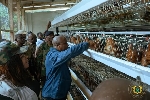
President Mahama’s agro-industrial revolution: Turning Ghanaian farms into business powerhouses
12:19
Laud Nartey: Growing unethical behaviour among bank staff- why BoG, GAB must scale up surveillance
07:02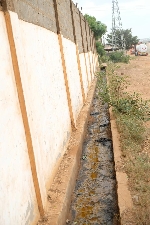
Trapped in a cycle of danger: blood in the recycling factory
12:58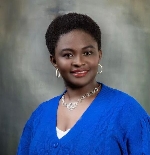
A new Africanism is rising: Why identity matters now
09:26
Kumasi High Court gripped by battle over Daddy Lumba’s widowhood rites
09:13
Drop in WASSCE 2025 performance – Reality check and opportunity for correction?
09:45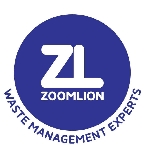
A vindicated Zoomlion?
03:12




